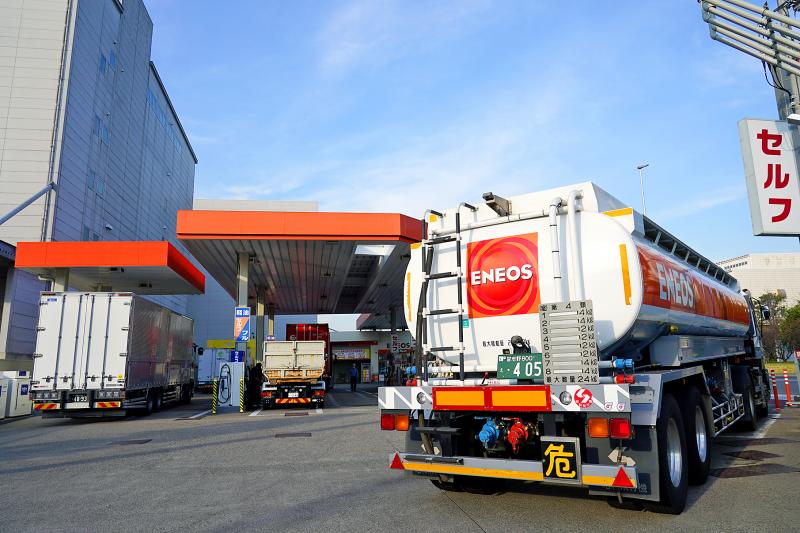Japanese energy conglomerate Eneos Holdings Inc yesterday said that it withdrawing from a gas project in coup-hit Myanmar, days after its Thai and Malaysian partners announced they would pull out.
Eneos is the latest energy giant to retreat from the Southeast Asian country, whose military has waged a widespread crackdown on dissent since it ousted and detained civilian leader Aung San Suu Kyi last year.
The company is involved in the Yetagun project off southern Myanmar along with the Japanese government and Mitsubishi Corp.

Photo: Bloomberg
Together they hold a 19.3 percent stake in the gas fields, which has been operational for two decades.
Eneos “decided to withdraw after discussions taking into consideration the country’s current situation, including the social issues and project economics based on the technical evaluation of Yetagun gas fields,” it said in a statement.
“This withdrawal will be effective after approval from the Myanmar government,” it added.
An official at the Japanese Agency for Natural Resources and Energy said that the government “takes the same position” as Eneos, adding that the Yetagun project has experienced a reduction in output over the past decade.
Malaysia’s Petronas and Thailand’s oil and gas conglomerate PTTEP announced their withdrawal on Friday. Petronas subsidiary Carigali holds an approximate 41 percent stake in the Yetagun project, while PTTEP owns 19.3 percent.
More than 1,800 civilians have died in Myanmar during the military crackdown and more than 13,000 have been arrested, a local monitoring group said.
With the economy tanking and pressure mounting from rights groups, companies including France’s TotalEnergies, British American Tobacco PLC and Norway’s Telenor Group have left the country.
Tokyo is a major provider of economic assistance to Myanmar, and the government has longstanding relations with the country’s military.
After the coup, Japan announced it would halt all new aid, although it stopped short of imposing individual sanctions on military and police commanders.

Real estate agent and property developer JSL Construction & Development Co (愛山林) led the average compensation rankings among companies listed on the Taiwan Stock Exchange (TWSE) last year, while contract chipmaker Taiwan Semiconductor Manufacturing Co (TSMC, 台積電) finished 14th. JSL Construction paid its employees total average compensation of NT$4.78 million (US$159,701), down 13.5 percent from a year earlier, but still ahead of the most profitable listed tech giants, including TSMC, TWSE data showed. Last year, the average compensation (which includes salary, overtime, bonuses and allowances) paid by TSMC rose 21.6 percent to reach about NT$3.33 million, lifting its ranking by 10 notches

Popular vape brands such as Geek Bar might get more expensive in the US — if you can find them at all. Shipments of vapes from China to the US ground to a near halt last month from a year ago, official data showed, hit by US President Donald Trump’s tariffs and a crackdown on unauthorized e-cigarettes in the world’s biggest market for smoking alternatives. That includes Geek Bar, a brand of flavored vapes that is not authorized to sell in the US, but which had been widely available due to porous import controls. One retailer, who asked not to be named, because

SEASONAL WEAKNESS: The combined revenue of the top 10 foundries fell 5.4%, but rush orders and China’s subsidies partially offset slowing demand Taiwan Semiconductor Manufacturing Co (TSMC, 台積電) further solidified its dominance in the global wafer foundry business in the first quarter of this year, remaining far ahead of its closest rival, Samsung Electronics Co, TrendForce Corp (集邦科技) said yesterday. TSMC posted US$25.52 billion in sales in the January-to-March period, down 5 percent from the previous quarter, but its market share rose from 67.1 percent the previous quarter to 67.6 percent, TrendForce said in a report. While smartphone-related wafer shipments declined in the first quarter due to seasonal factors, solid demand for artificial intelligence (AI) and high-performance computing (HPC) devices and urgent TV-related orders

MINERAL DIPLOMACY: The Chinese commerce ministry said it approved applications for the export of rare earths in a move that could help ease US-China trade tensions Chinese Vice Premier He Lifeng (何立峰) is today to meet a US delegation for talks in the UK, Beijing announced on Saturday amid a fragile truce in the trade dispute between the two powers. He is to visit the UK from yesterday to Friday at the invitation of the British government, the Chinese Ministry of Foreign Affairs said in a statement. He and US representatives are to cochair the first meeting of the US-China economic and trade consultation mechanism, it said. US President Donald Trump on Friday announced that a new round of trade talks with China would start in London beginning today,